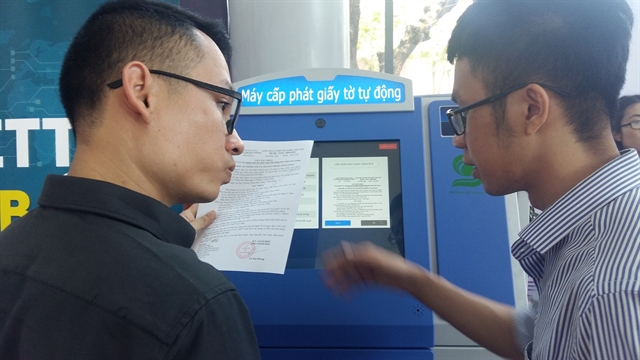 Society
Society

 |
| Visitors check an automatic procedure support service at Đà Nẵng City's Administrative Centre. Việt Nam has been speeding up digitalisation over past decades in order to build a digital government, economy and society. VNS Photo Công Thành |
ĐÀ NẴNG — Drastic measures and accelerated administration reform have led to the simplification of 4,751 out of 5,000 public procedures from provinces and cities nationwide over the past decade.
The changes have also saved an estimated US$2 billion, which communities and businesses would have spent on administrative paperwork.
Deputy head of the Administrative Procedures Control Agency under the Government Office, Nguyễn Duy Hoàng gave the figures to an audience at the Việt Nam Digital Government Summit in the central city last week, adding that 71.5 per cent of administrative procedures are now available online.
Residents and businesses can now apply for 3,627 completely online service procedures, which represents an increase from 20 per cent in 2022, to 59 per cent in 2024, according to the official.
However more than 1,000 online procedures do not meet the criteria needed from the demands of people and businesses at some provinces and cities.
 |
| A man tests a virtual device at a pavilion on digitalisation and IT application in Đà Nẵng City. VNS Photo Công Thành |
“We checked and 449 out of 1,800 online procedures at each locality were disqualified and local residents have still had to come into an office for offline final paper check. Meanwhile, only 1.21 per cent of online services were completed in time,” he complained.
He explained that poor performance of online procedure processing resulted from mismatched data exploitation and solutions among different management divisions and agencies.
Quảng Ninh was the first province in Việt Nam to introduce a one-stop shop in 2015, before the service was expanded nationwide in 2018.
Vice chairperson of Đà Nẵng City’s people’s committee, Nguyễn Thị Anh Thi said that Đà Nẵng was seen as a leader in terms of online public administrative procedures, with performance ratings of 95 and 65 per cent.
She said the city debuted e-government from 2014 and started a full digital transformation plan in 2021.
“We have been speeding up the digitalisation process, to build Đà Nẵng into the first ‘smart’ city in Việt Nam by 2030. The city’s digital economy accounted for 20.7 per cent of Gross Regional Domestic Product (GRDP) in 2023 and the figure is expected to reach from 35 per cent to 45 per cent in 2030-45,” Thi said.
 |
| Smart management and solutions are introduced at the Việt Nam Digital Government Summit in Đà Nẵng City. VNS Photo Công Thành |
Deputy director of the city’s Information Technology and Communications department, Trần Ngọc Thạch said 18 out of 30 per cent of online procedures were working, adding that a complete digital ecological system has been built to provide 41,000 QR codes attached to finished online procedures.
The city’s Facebook page operates as an online public evaluation tool on administrative procedures across 56 communes, precincts and departments throughout the city. Đà Nẵng is also ready to connect up with the 126 smart cities network in ASEAN, according to Thạch.
Senior advisor to Sovico Group Lê Đăng Dũng, said his company had been widely applying AI in data analysis and decision making, as well as using chatbots and virtual assistants across many businesses from banking, air service, hospitality and real estate.
But Dũng warned that legal framework for a digital business environment iwas still limited in Việt Nam in building trust among investors.
He said that there was not a strong or strict enough legal framework for protecting trans-border databases and cybersecurity was a major concern for investors, including Google groups in the US.
Việt Nam should look at being ready to welcome investment in new tech sectors including Artificial Generative Intelligence (AGI), quantum computation, the aerospace industry and nuclear power, sectors which would be booming in 2030, he said.
Dũng said a shared database was being developed for use among different business sectors of Sovico with a manpower of 40,000 worldwide.
He also urged rapid change in building an effective digital society and legal framework reform in receiving new waves of investment, within the development of the global digital era, the semiconductor industry and supply chains. VNS




